Eat Better to Swim Faster and Recover Quicker: the Ultimate Nutrition Guide for Swimmers

Good nutrition is a vital, albeit commonly overlooked aspect of swim training. Many athletes who may not see it as an important part of their training disregard this essential component. While most athletes can still perform without paying much attention to their diet, they won’t be performing at their best and may be missing out on reaching their full potential. Eating well during training and in the days before an event can help you recover quicker and swim faster. Proper nutrition for swimmers can mean the difference between placing first or second.
Like a car, the human body is an intricate machine that needs the proper fuel to operate at its best. Swimmers need proper nutrition for efficient maintenance of body weight, energy, recovery and hydration. Without it, they aren’t able to optimally perform and recover as quickly as they could. Poor nutrition also results in a weakened immune system, which makes you more susceptible to illness. Good nutrition can be used to fuel the body, improve performance and speed up recovery.
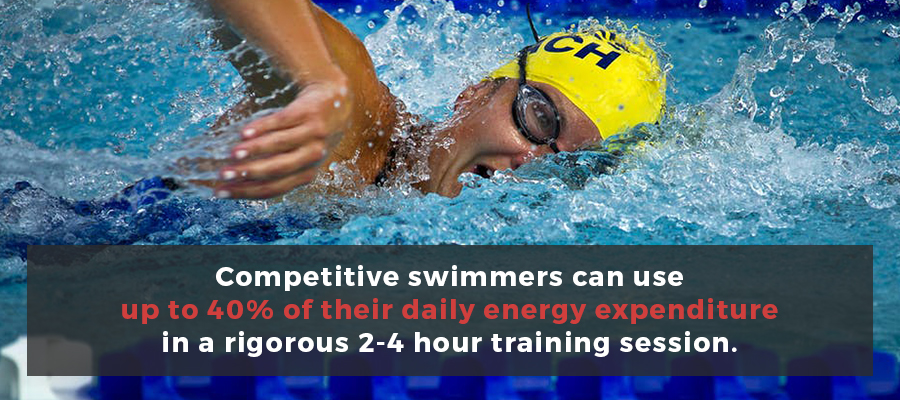
Competitive swimmers can use up to 40% of their daily energy expenditure in a rigorous 2-4 hour training session. Their muscles are continuously being broken down and built back up. The nutrients that are lost can't be adequately restored with just ordinary eating habits. It’s important for aerobic athletes to learn more about balancing carbohydrates, protein, and other essential macronutrients, along with staying properly hydrated.
There are many helpful diet tips for swimmers looking to improve their overall nutrition. Different foods serve specific purposes in the body and assist in various body functions such as muscle synthesis and repair. Planning meals and learning how to make smarter food choices can help you to begin a proper nutrition regimen that will help you reach your full potential. While developing and following an appropriate nutrition routine takes some time, research and planning, over time you will see an improvement in the way you feel and how you perform.
Eat the Right Kinds of Protein as a Swimmer
Protein is essential in muscle recovery and also keeps you from feeling hungry during your training. You should aim to include some protein in each meal and snack. Eating a small amount of protein about an hour before a workout can decrease muscle breakdown and prepare your muscles to start recovering right away.
Many athletes believe that they have to consume large amounts of protein for it to be effective. However, this is not the case. The extra protein not used by the muscles will be stored in fat cells. It's more important to choose high-quality, or “High-biological value” (HBV) proteins. HBV protein refers to the types of proteins that contain the amino acids needed by humans for muscle recovery after workouts. HBV proteins include meats such as beef, chicken and turkey, whole eggs, milk and fish. Vegetarian HBV protein includes soybeans and other plant proteins. You should aim for your main meals to have 20-40 grams of protein per serving.
Know When to Eat Simple & Complex Carbohydrates
While too many carbohydrates are not good for you, for swimmers and other aerobic athletes, they are essential for energy, training and recovery. They are the units that fuel the body and the nutrients that the body burns most efficiently. Carbohydrates can be classified as either simple or complex. Simple carbohydrates are quick-burning foods that quickly turn into sugar. Complex carbohydrates are foods that take longer for your body to break down.
Carbohydrates should make up about half of your caloric intake, with the recommendation for swimmers being about 8-10 grams per kilogram of body weight. Your carbohydrate intake should be adjusted according to the frequency and intensity of your training along with the type of event for which you’re training. The more intense the training, the more carbohydrates and starchy foods should be consumed.
Simple carbohydrates should be eaten before, during and directly after workouts. Simple carbohydrates are quickly broken down in the body and result in a rapid blood sugar spike. Sports drinks, fruits, honey and pretzels are good choices. While fruits do contain significant amounts of sugar, they're also high in fiber, which breaks down the sugar more slowly. Fruits with edible skins are the highest in fiber. Fruit also contains other vitamins and nutrients such as Vitamin C and potassium.
Outside of workouts, complex carbohydrates are best. Lentils, beans, whole grains and vegetables are healthy foods that provide complex carbohydrates. A great hint for choosing vegetables with the most complex carbohydrates is to think of autumn. Pumpkin, squash and sweet potatoes are excellent sources of complex carbohydrates. Whole grain bread containing oats, barley, rye and whole wheat are better than those that contain refined flour. Brown rice is a better choice than white rice, as it hasn't been refined. Grains such as bulgur, quinoa and millet are also helpful to introduce into your diet. Air-popped popcorn, without butter or salt, is a very healthy whole grain snack, which can be seasoned with herbs rather than salt.
Eating both carbohydrates and protein after workouts is the most beneficial since the carbohydrates stimulate the production of insulin which helps your muscles best utilize the protein to repair muscles. Snacks that combine both carbohydrates and proteins include peanut butter and jelly sandwiches and chocolate milk.
Stay Hydrated While Swimming
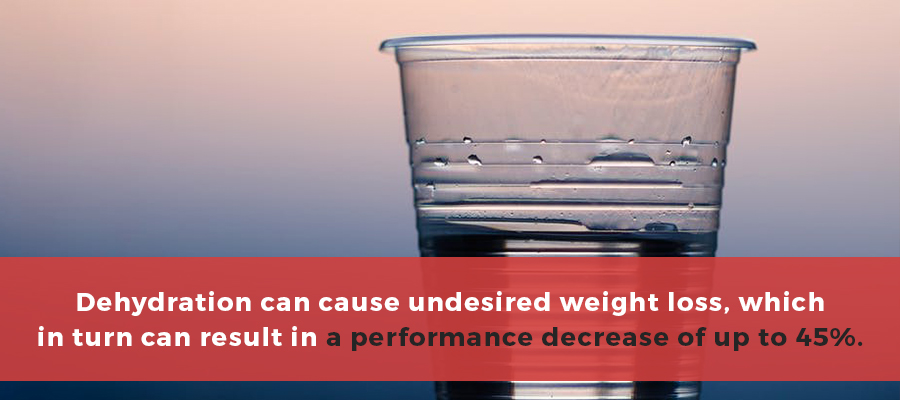
In a sport where you’re immersed in water, it’s also important for swimmers to keep the inside of their body hydrated. Swimmers actually sweat a lot, but this often goes unnoticed while in the water. Many athletes overlook this vital element and don’t drink the recommended amount of water daily, which is ¾ gallon for females and 1 gallon for males daily. As a result, electrolyte and fluid imbalances are commonly found in swimmers.
In swimmers, dehydration can cause undesired weight loss, which in turn can result in a performance decrease of up to 45%. Swimmers should compensate for any weight loss after workouts by drinking enough water to replenish what was lost. Many athletes may not even realize that they're dehydrated since they often don't realize how much they're sweating. Monitoring the urine to make sure that it is a light yellow color is a good indicator of the body’s hydration level. Hydration should occur during and after workouts and competitions. It’s recommended that you replace about 125%-150% of the fluid lost, within the first 4-6 hours of recovery, to achieve proper fluid balance. Keeping a water bottle nearby at all times is a great reminder to keep drinking.
Eliminate Temptation and Plan Meals Ahead
While swimmers are often known for their big appetites after grueling workouts and events, it’s not an excuse to eat loads of junk food and other things you should avoid, such as overly processed foods and those with lots of sugar and bad fats. Even if you're eating a lot, it's still possible to be malnourished if you're eating the wrong foods. It's challenging to avoid bad foods if they are readily available in your pantry or fridge. Eliminating them from your environment will help you to avoid the temptation of eating them.
An effective way to eliminate temptation while trying to eat well is to plan your meals ahead. Planning your meals and snacks allows you to have control over your nutritional needs and ensures that each meal is providing you with the nutrients that you need. Having a well-planned meal routine prevents you from feeling like you’re starving and eliminates impulsive eating and poor food choices. While planning meals ahead does require some forethought, it doesn’t mean that you have to spend hours shopping and cooking each week.
Not purchasing unhealthy foods is another way to avoid temptation. Before grocery shopping, make a list of all the ingredients you need and stick to it. This provides a plan to follow and prevents you from having to return for forgotten items. Also make sure that you’re not shopping while hungry, as this can cause you to purchase foods that may not be healthy choices. Here are some other helpful tips to follow while grocery shopping to help choose healthy foods:
- Choose fresh and colorful fruits and vegetables to help you to include as many vitamins, minerals and nutrients as possible.
- Shop around the perimeter of the store where the produce, whole grain bread, meat and dairy section are located. Processed junk foods tend to be placed in the center of most grocery stores.
- Choose foods with whole grains, those labeled “100% real” and contain few ingredients. Stay away from foods with too much sugar or those with artificial ingredients whose names are difficult to pronounce.
Becoming familiar with portions can help you to eat well even if you’re out or don’t have time to prepare a meal at home. This shouldn't be mistaken for counting calories since most athletes are too busy and tired to worry about keeping track of their caloric intake. Eating well eliminates the need for counting every calorie. Preparing pre-portioned meals is an option although there are a number of healthy foods such as fruits, nuts and meat/cheese snacks that come prepackaged to help save you time.
Eating well in the days before an event can positively affect your performance. Planning the meals that you’ll eat in the 48 hours before a competition or other event is the best way to ensure that you’re eating properly so you can perform at your best.
Planning your meals doesn’t mean that you can’t eat what you want, it just makes it easier to eat smarter. Over time, you’ll develop lasting habits that lead to performance gains, good health and sound body composition. The benefits of healthy eating are extremely worth the time and effort.
Consider Nutritional Supplements
A common question of athletes and swimmers is whether or not they should be using vitamin or mineral supplements. While a well-balanced nutrition plan helps to ensure that you are getting all of the nutrients you need, you may still need to supplement if you have any deficiencies. Deficiencies in vitamins and minerals can wreak havoc on your body and performance. It’s recommended that you discuss any questions or concerns with your physician before taking any supplements.
Zinc is essential for proper digestion and metabolism and also aids in healing. Zinc deficiency is commonly found in competitive swimmers, which can be due to not ingesting enough zinc-rich foods, losing zinc through sweat or urine or through the body rapidly using zinc stores for tissue repair. Foods that are high in zinc include red meat, poultry, seafood such as shrimp and oysters, beans and nuts. Iron deficiency is commonly associated with zinc deficiencies as well.
Vitamin D is essential for bone and muscle health. Vitamin D deficiency is a common deficiency found in the general population and also in swimmers. It can cause a wide variety of symptoms including muscle weakness. Swimmers who train outdoors are less likely to have a vitamin D deficiency than those who train primarily indoors since 15 minutes a day of direct sunlight provides you with the recommended daily dose. Foods that are high in Vitamin D include eggs, salmon, fortified cereals, mushrooms and milk (including soy milk). Swimmers may want to consider taking a vitamin D during winter months or if they start to notice any symptoms of a deficiency.
Balancing It All
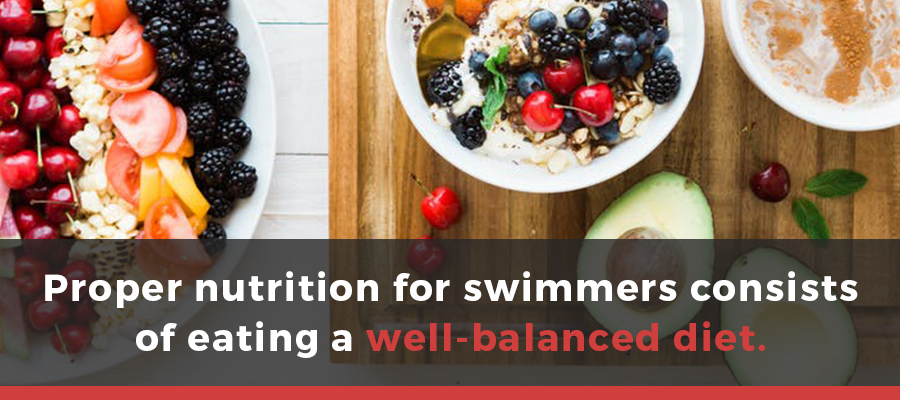
Proper nutrition for swimmers consists of eating a well-balanced diet. While each athlete’s nutritional requirements and goals may differ widely, the ultimate goal is an increase in performance. It’s important to balance your protein and carbohydrates and fats to see optimum results. Many athletes benefit from visiting dieticians or nutritionists to help get them started on a healthy eating plan.
Here is a basic nutrition guide for swimmers with some suggestions for meal planning:
Breakfast
- Combination of protein, vegetables and fruit
- Eggs
- Turkey sausage
- Whole grain toast
- Cereal
- Cottage cheese
- Milk
Lunch/ Dinner
- Tuna/ turkey on whole grain bread
- Vegetable stir-fry with brown rice
- Whole grain pasta
- Lean proteins (chicken, beef, fish, turkey and tofu)
- Good fats such as olive oils, avocados and coconut oil
- Beans and lentils
- Vegetables (fresh or steamed)
- Spinach salad with fruit, nuts and olive oil
Snacks
- Greek yogurt with fresh or frozen fruit
- Nuts
- Hummus dip with vegetables
- A sprinkling of protein powder over any of the above snacks provides added protein
- Hard boiled eggs
- Granola bar
- Seeds
Dessert
- Fruits
- Smoothies



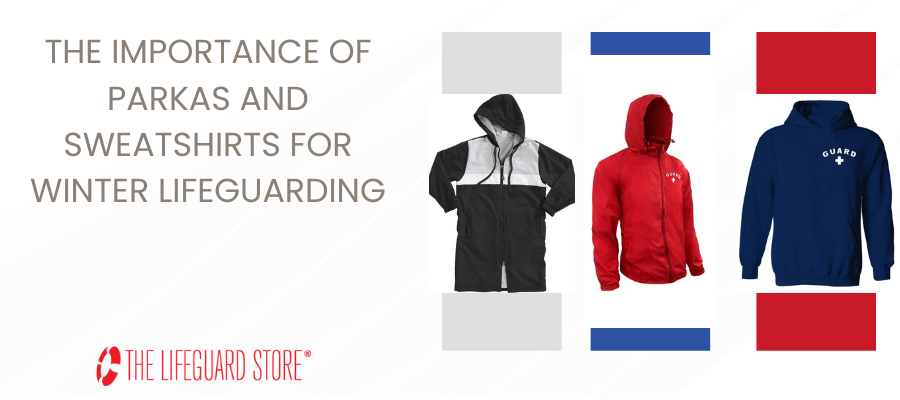
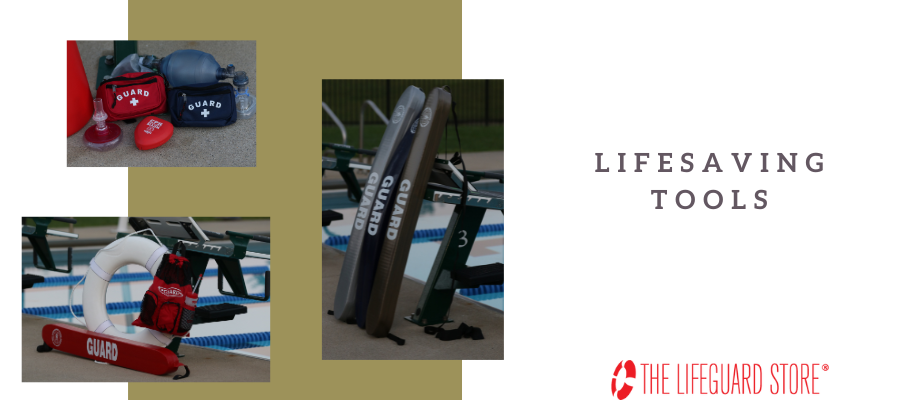
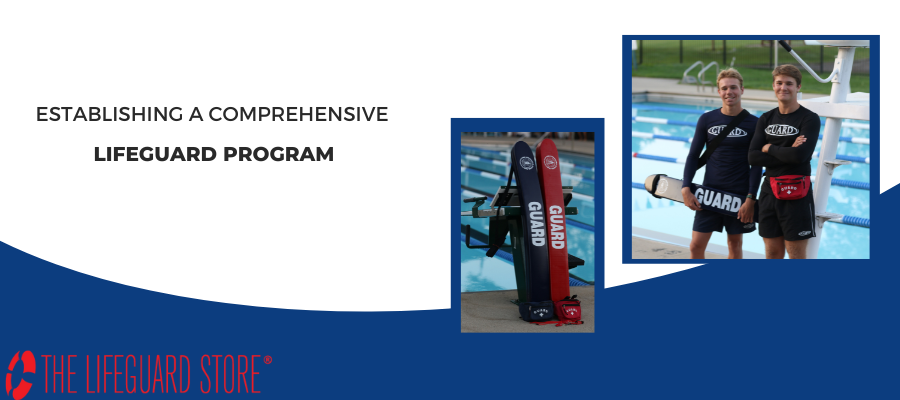
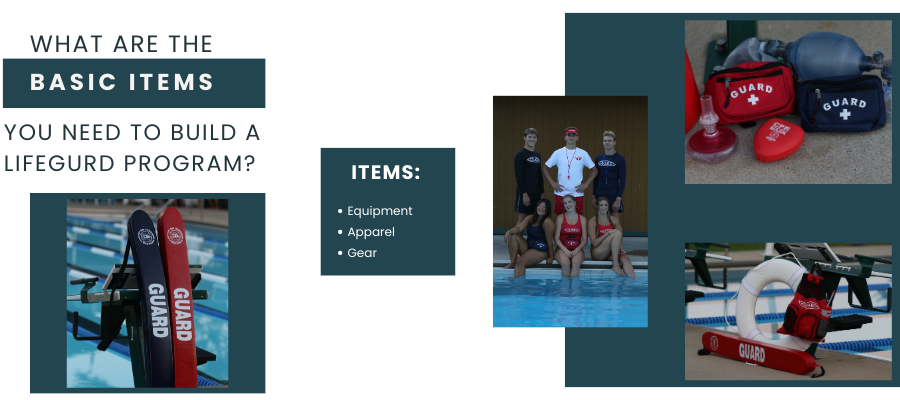
Leave a Comment
Your email address will not be published. Required fields are marked *